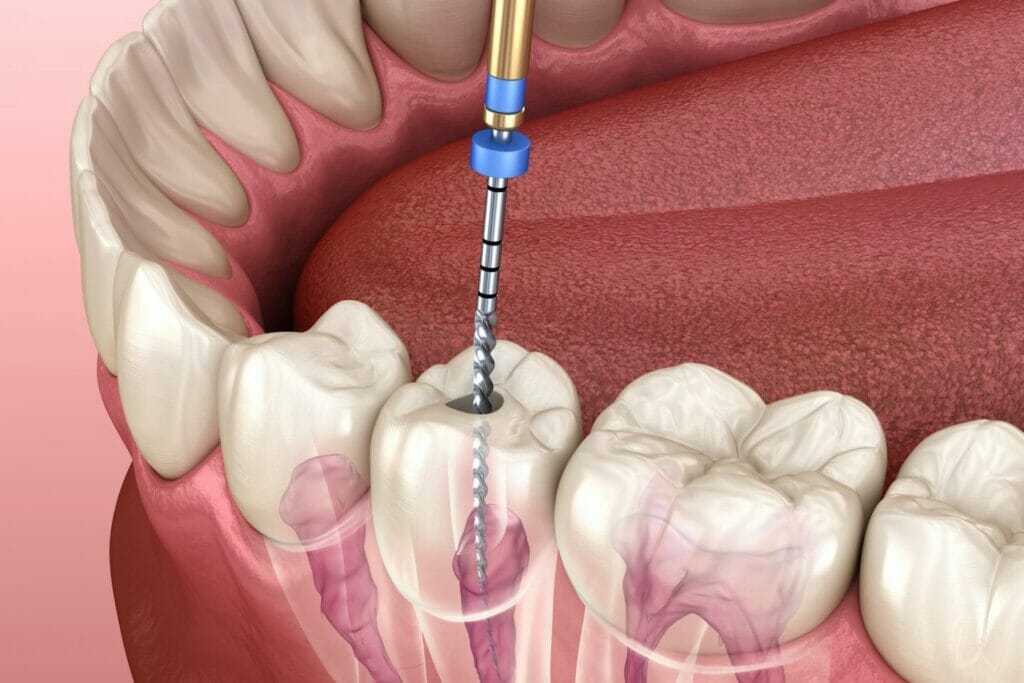Root canal treatment is a common dental procedure that can save your tooth from extraction. However, getting a root canal often makes people anxious and scared. But fear not! In this blog post, we’ll walk you through what to expect during and after a root canal treatment so you can feel prepared and at ease when it’s time for your appointment. So sit back, relax, and let’s dive into all things root canal!
What To Expect During A Root Canal Treatment
During a root canal treatment, you can expect to feel some discomfort and pressure. This is because the dentist will be removing the infected pulp from inside your tooth. However, this discomfort should not be unbearable and your dentist will do their best to make sure you are as comfortable as possible throughout the procedure.
The root canal procedure typically involves numbing the area around your affected tooth with a local anesthetic. Your dentist will then create a small hole in the top of your tooth and use special tools to remove all of the infected tissue from inside it carefully.
Once all of the infected tissue has been removed, your dentist will clean out any remaining debris before filling in the root canals with a sealer paste or other material. They may also place a temporary filling overtop until they can complete further work on restoring your tooth.
It’s important to note that each case is unique and some people may require multiple appointments for full treatment completion. However, most patients find that after their root canal treatment is completed, they experience significant relief from pain or sensitivity related to their affected tooth.
How To Prepare For A Root Canal Treatment
Preparing for a root canal treatment can help make the procedure smoother and more comfortable. Firstly, it is important to inform your dentist of any medications or medical conditions you have. This allows them to take necessary precautions and ensure that the anesthesia used during the procedure is safe for you.
It is also recommended to avoid consuming alcohol or smoking before the appointment as these habits may interfere with healing after the treatment. Additionally, wearing comfortable clothing and avoiding tight-fitting clothes around the neck area can increase comfort during the procedure.
Before heading to your appointment, it may be helpful to mentally prepare yourself by practicing relaxation techniques such as deep breathing exercises. It’s normal to feel nervous about dental procedures so remember that your dentist will do their best to keep you calm and comfortable throughout.
Arrange for someone trusted like a friend or family member who can drive you home since numbness due to anesthesia could persist even after leaving there.
What To Do After A Root Canal Treatment
After a root canal treatment, the treated tooth will be sore and sensitive for a few days. It’s important to take care of your mouth during this time to prevent any further complications.
- Firstly, avoid eating hard or crunchy foods that may irritate the treated area. Stick with softer foods and chew on the opposite side of your mouth.
- Secondly, brush and floss gently around the affected tooth. Be careful not to aggravate the area but still maintain good oral hygiene.
- Thirdly, take any prescribed pain medication as directed by your dentist. This will help manage any discomfort you may experience after the procedure.
Attend all follow-up appointments with your dentist to monitor how well you’re healing. If you experience severe pain or swelling, contact your dentist immediately as it could indicate an infection or other complication.
Remember that each person’s healing process is different so don’t compare yourself to others who have had similar procedures done. Take care of yourself and follow up with proper dental care post-treatment to ensure a healthy recovery.
The Bottom Line
In summary, a root canal treatment may seem daunting but it is a routine dental procedure that can save your tooth and prevent further complications. During the procedure, you will be given anesthesia to ensure that you are comfortable throughout the process. Afterward, you may experience some discomfort or sensitivity that can be managed with over-the-counter pain relievers.
To prepare for a root canal treatment, make sure to talk to your dentist about any concerns or questions that you may have. Also, avoid eating hard foods before the procedure and take the necessary antibiotics as prescribed.
After the treatment, follow your dentist’s post-operative instructions carefully. This includes avoiding hard or crunchy foods and maintaining good oral hygiene practices.
Remember that a root canal treatment is an investment in your dental health and well-being. By taking care of your teeth and visiting your dentist regularly, you can help prevent future dental problems from arising.

